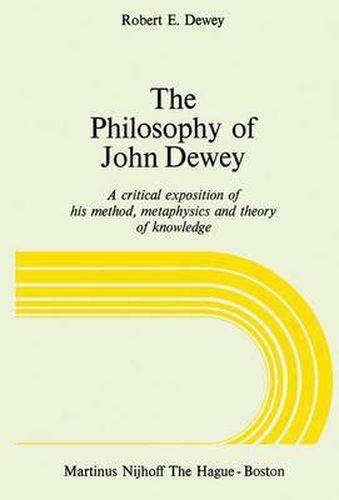Readings Newsletter
Become a Readings Member to make your shopping experience even easier.
Sign in or sign up for free!
You’re not far away from qualifying for FREE standard shipping within Australia
You’ve qualified for FREE standard shipping within Australia
The cart is loading…






This title is printed to order. This book may have been self-published. If so, we cannot guarantee the quality of the content. In the main most books will have gone through the editing process however some may not. We therefore suggest that you be aware of this before ordering this book. If in doubt check either the author or publisher’s details as we are unable to accept any returns unless they are faulty. Please contact us if you have any questions.
John Dewey ranks as the most influential of America’s philosophers. That in fluence stems, in part, from the originality of his mind, the breadth of his in terests, and his capacity to synthesize materials from diverse sources. In addi tion, Dewey was blessed with a long life and the extraordinary energy to express his views in more than 50 books, approximately 750 articles, and at least 200 contributions to encyclopedias. He has made enduring intellectual contributions in all of the traditional fields of philosophy, ranging from studies primarily of interest for philosophers in logic, epistemology, and metaphysics to books and articles of wider appeal in ethics, political philosophy, religion, aesthetics, and education. Given the extent of Dewey’s own writings and the many books and articles on his views by critics and defenders, it may be asked why there is a need for any further examination of his philosophy. The need arises because the lapse of time since his death in 1952 now permits a new generation of scholars to approach his work in a different spirit. Dewey is no longer a living partisan of causes, sparking controversy over the issues of the day. He is no longer the advocate of a new point of view which calls into question the basic assump tions of rival philosophical schools and receives an almost predictable criticism from their entrenched positions. His works have now become classics.
$9.00 standard shipping within Australia
FREE standard shipping within Australia for orders over $100.00
Express & International shipping calculated at checkout
This title is printed to order. This book may have been self-published. If so, we cannot guarantee the quality of the content. In the main most books will have gone through the editing process however some may not. We therefore suggest that you be aware of this before ordering this book. If in doubt check either the author or publisher’s details as we are unable to accept any returns unless they are faulty. Please contact us if you have any questions.
John Dewey ranks as the most influential of America’s philosophers. That in fluence stems, in part, from the originality of his mind, the breadth of his in terests, and his capacity to synthesize materials from diverse sources. In addi tion, Dewey was blessed with a long life and the extraordinary energy to express his views in more than 50 books, approximately 750 articles, and at least 200 contributions to encyclopedias. He has made enduring intellectual contributions in all of the traditional fields of philosophy, ranging from studies primarily of interest for philosophers in logic, epistemology, and metaphysics to books and articles of wider appeal in ethics, political philosophy, religion, aesthetics, and education. Given the extent of Dewey’s own writings and the many books and articles on his views by critics and defenders, it may be asked why there is a need for any further examination of his philosophy. The need arises because the lapse of time since his death in 1952 now permits a new generation of scholars to approach his work in a different spirit. Dewey is no longer a living partisan of causes, sparking controversy over the issues of the day. He is no longer the advocate of a new point of view which calls into question the basic assump tions of rival philosophical schools and receives an almost predictable criticism from their entrenched positions. His works have now become classics.